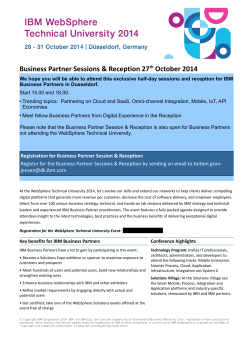
STG Lab Services LPM Validation Tool James Chandler IBM STG Lab Services
STG Lab Services LPM Validation Tool James Chandler IBM STG Lab Services jamesrc@us.ibm.com © 2013 IBM Corporation © 2013 IBM Corporation What is the STG Lab Services LPM Validation Tool The STG Lab Services LPM Validation Tool is a Perl script (and associated modules) that can be used to perform a LPM validation for an entire frame at once and chart the results in an Excel spreadsheet. Optionally, a specific list of LPAR IDs can be specified if you wish to skip validation of certain LPARs. Currently two versions: one for AIX V6 and one for AIX V7 © 2013 IBM Corporation Who should use the STG Lab Services LPM Validation Tool and why? The STG Lab Services LPM Validation Tool can be used by consultants that have a need to perform LPM validations of a large number of LPARs and document the results for a customer. Often customers will ask for a LPM “Healthcheck” of their environment prior to attempting mass migrations and/or a full frame evacuation. These validations would normally be performed via the HMC GUI and their results logged manually in a spreadsheet or text document. The LPM validation tool allows for an automated collection of the data and logging of the results in a Excel spreadsheet, potentially saving hours of effort for a consultant that has been tasked with manually performing multiple LPM validations and communicating the results to the customer. © 2013 IBM Corporation Installation and usage Installation consists of choosing the appropriate .tar.gz file based on your Operating system and uncompressing/un-tarring in a local directory. Prior to running the script for the first time, you will need to manually ssh to the HMC hostname/IP address in order to update the HMC's known_hosts file. Syntax is as follows: ./lpm_validate.pl -m Server-Power7-750 -t Server-Power7-Plus -h 9.5.168.24 -u jamesrc -p mypassword -id all -o test.validate.xls In the above example: -m is used to specify the source system -t is used to specify the target system -h is the ip address or hostname of the HMC -u is the userid used to login to the HMC -ip [optional] remote or destination HMC if the target managed system exists on a remote HMC -p is the password -id is the a comma separated list of LPAR IDs that you want to run a validation against, or optionally you can use the keyword "all" and it will do the entire frame (filtering out the VIO servers) -o is the name of the output file, which will be created in Excel format © 2013 IBM Corporation Example output: © 2013 IBM Corporation
© Copyright 2025
















